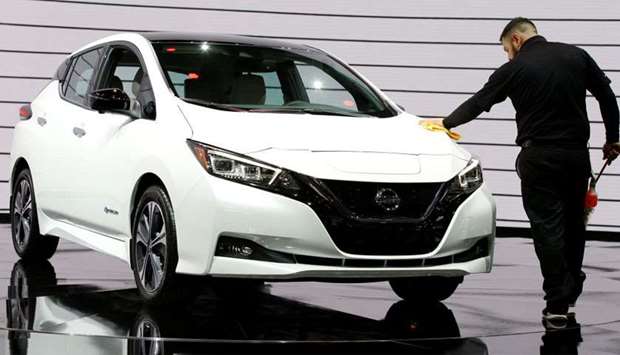* Nissan Leaf first EV to qualify for German power grid
* V2G technology enables power flow between car and grid
* Nissan targeting corporate fleets
* Nissan relies on CHAdeMO charging standard
Nissan's Leaf became the first electric vehicle (EV) to secure regulatory approval as an energy backstop for Germany's electricity grid, the Japanese carmaker said on Tuesday, something it hopes will attract corporate fleet customers.
So-called vehicle-to-grid (V2G) technology is a connection between the EV and the grid through which power can flow from the grid to the vehicle and vice-versa. That potentially enables car owners to sell energy to the network, while utilities could use electric cars as a backstop if demand rises.
Nissan said it would initially target corporate clients with fleets of more than 60 electric vehicles, adding that services based on V2G technology would be offered in Germany from next year onwards.
There will be 280 million electric vehicles by 2040, according to estimates by the International Energy Agency, compared with more than 3 million last year.
‘We strongly believe in an emission-free future,’ Guillaume Pelletreau, Vice President and Managing Director, Nissan Center Europe, said. ‘Leaf batteries could make an important contribution to energy transition in Germany and a sustainable future.’
The initiative was also supported by Daimler-backed The Mobility House, local utility Enervie and German transmission system operator Amprion, which is co-owned by RWE and infrastructure investors including Munich Re , Swiss Life and Talanx.
Nissan is relying on the CHAdeMO charging standard, which has been jointly developed by several Japanese companies as a competitor to Tesla's supercharger system and the European-backed Combined Charging System (CCS).
That puts Nissan at odds with European carmakers, including BMW and Volkswagen, who are pushing to have the CCS, which is also capable of V2G services, established.
‘Nissan is ahead for now but other technologies, including Tesla's supercharger can theoretically do the same thing,’ said Thomas Raffeiner, chief executive and founder of The Mobility House.
Nissan has so far sold about 370,000 electric vehicles and, along with top shareholder Renault, has been very active in exploring how car batteries can be integrated into the wider power system.
While a mass uptake of EVs is expected to put a major strain on the power grid and require billions of euros in infrastructure investments, car batteries have already proven that they can become part of the network.

